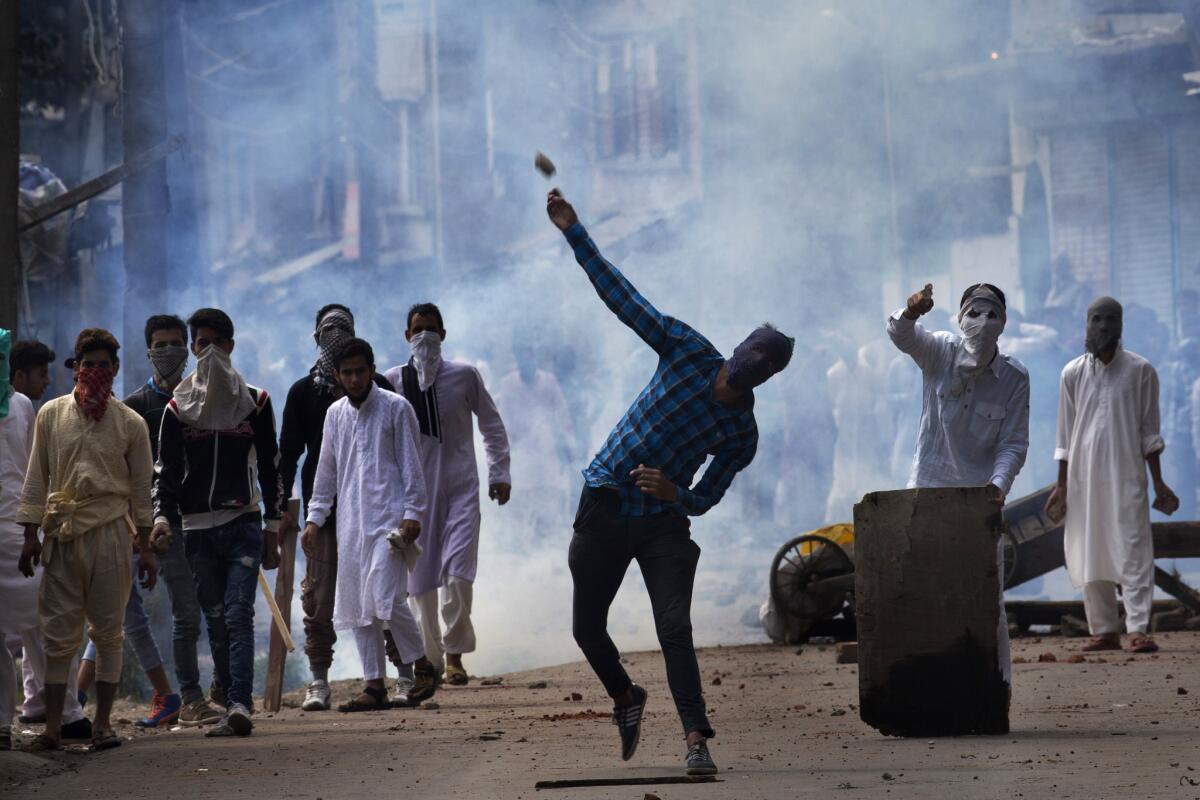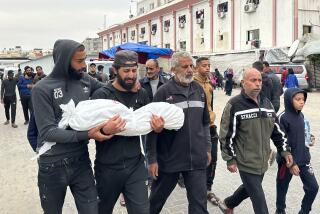India swiftly rejects U.N. request for a visit to the disputed territory of Kashmir

Reporting from Mumbai, India â India on Tuesday rejected a request by the United Nationsâ human rights chief for a visit to gather information on the disputed territory of Kashmir, where security forces have been accused of using excessive violence in trying to quell unrest.
Zeid Raad Hussein, the U.N. high commissioner for human rights, called for âaccess that is unconditional to both sides of the Line of Control,â the boundary between India and Pakistan that runs through Kashmir.
Speaking to the U.N. Human Rights Council in Geneva, Hussein said his request was granted by Pakistan, which accuses Indian forces of human rights violations in the Himalayan territory that the countries have skirmished over for seven decades.
âI believe an independent, impartial and international mission is now needed crucially and that it should be given free and complete access to establish an objective assessment of the claims made by the two sides,â Hussein said.
New Delhi swiftly responded that an external inquiry was unnecessary and that it was âfully engaged in normalizing the situation as soon as possible.â
âIndian democracy has all that is required to address legitimate grievances,â the Indian external affairs ministry said in a statement.
At least 81 people â nearly all civilians â have died in the Indian-controlled portion of Kashmir since July 9, when protests erupted after Indian security forces killed Burhan Wani, a 22-year-old separatist.
Stone-throwing demonstrators have attacked police stations and government buildings. Indian paramilitary police have responded by firing live rounds, tear gas and pellets from pump-action shotguns, often striking demonstrators in the head.
In the main government hospital in Srinagar, the summer capital of Indian-administered Kashmir, more than 800 people have been treated for eye injuries caused by the pellets, which are made of metal and encased in a thin rubber coating. Many of them have lost at least partial eyesight.
The violence continued Tuesday when two people were killed, including a 19-year-old man, and dozens injured in clashes with security forces who were enforcing a rare curfew on the Muslim holiday of Eid al-Adha.
Authorities imposed the curfew across all 10 districts of Kashmir to thwart plans by separatist groups to march to the local offices of the United Nations, Indian news media reported.
India and Pakistan each control portions of Kashmir but claim the territory in its entirety. Separatists in the Muslim-majority territory have taken up arms to seek independence from Hindu-dominated India or a merger with Pakistan.
Under a controversial security law, Indian authorities enjoy broad powers to crack down on unrest in Kashmir. Human rights groups have assailed tactics used by security forces, accusing paramilitary police of firing pellets that have injured or blinded peaceful demonstrators and even children sitting in their homes.
âThese weapons are inherently indiscriminate and always carry the risk of causing serious injury to people who are not engaging in violence,â said Amnesty Internationalâs India director, Aakar Patel. âThere is simply no proper way to use these weapons, and they should be prohibited.â
On Sept. 2, Indian officials approved an alternate to the pellets â a shell packed with a compound derived from chili peppers â that it said would be used only in rare cases. But Amnesty said more than 100 cases of pellet injuries were reported at hospitals in Srinagar in the first week of the month.
India has defended its actions in Kashmir, saying its forces have shown âtremendous restraintâ and accusing Pakistan of supporting militant groups.
Relations between the nuclear-armed rivals have deteriorated markedly since last Christmas, when Indian Prime Minister Narendra Modi made an unannounced visit to his Pakistani counterpart, Nawaz Sharif. Hopes that the meeting would help re-launch peace talks quickly collapsed after a militant raid on an Indian air base that New Delhi said was sponsored by Pakistan.
In recent weeks, Modi has referred to Pakistan, without naming it, as the âone countryâ spreading terrorism in South Asia.
Read more: The telegenic young militant whose death has fueled two months of unrest in Kashmir Âť
Follow @SBengali on Twitter for more news from South Asia
More to Read
Sign up for Essential California
The most important California stories and recommendations in your inbox every morning.
You may occasionally receive promotional content from the Los Angeles Times.











